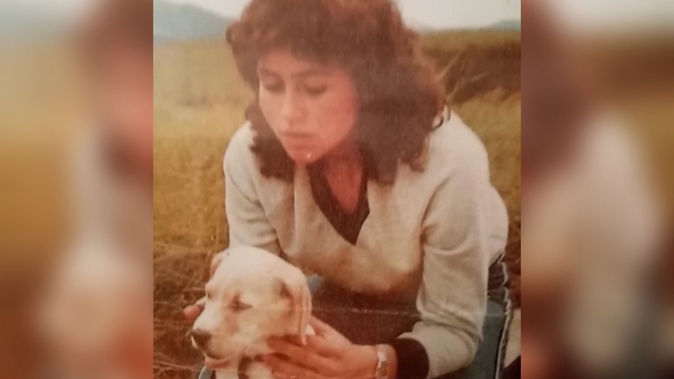

When Erica Plaistow sees the photo of the young murder victim Leah Stephens sitting awkwardly in a strapless red dress or reads about her being described as a sex worker, prostitute and stripper she gets angry.
Plaistow, who lent the dress to the 20-year-old for a family gathering, said those descriptions aren’t an accurate depiction of the young women she knew.
Instead, she prefers to remember Stephens, who was her partner’s cousin, as a kind and lovely young woman who stayed on her couch from time to time and helped with babysitting.
She says a treasured photo of Stephens playing with a puppy is a much better reflection of the person she remembers, not the frequently published picture of her in a short red dress and black high heels that often accompanies stories about her being a murdered sex worker.
Plaistow said she last saw Stephens about a week before she disappeared in 1989 after being snatched off the street, but she didn’t know she was working as a prostitute at the time. It was three years before her remains were found by a man walking his dog near the Muriwai Golf Course.
Stephen Ralph Stone was convicted and imprisoned 25 years ago for her rape and murder as well as the murder of West Auckland tyre fitter Deane Fuller-Sandys. This week he was granted bail by the High Court at Auckland.
It comes after the Court of Appeal this month quashed his convictions, along with those of three people who were convicted for their part in Fuller-Sandys’ death. Stone is the only one facing a possible retrial, although that decision rests with the Auckland Crown solicitor.
Plaistow said Stephens and Stone worked together at the same strip club.
 Leah Stephens went missing in 1989. Her body was found in Woodhill Forest in 1992.
Leah Stephens went missing in 1989. Her body was found in Woodhill Forest in 1992.
Plaistow says she’s fought to keep Stone behind bars, making sure her views were heard when his Parole Board hearings came up.
“Every time I heard he was up for parole I wrote letters and everything. He never got released.”
Until now.
Plaistow said there’s nothing she can do about the fact his conviction was quashed and he now has bail, but she’s speaking publicly because she’s upset at the way Stephens has always been portrayed with constant references to her being a sex worker.
‘All she wanted was love’
She wanted people to know that Stephens suffered horrific childhood abuse and she believes that’s why the young woman ended up working as a prostitute.
It was that abuse that saw Plaistow step in and help Stephens when she was about 14 years old.
Stephens would babysit her two young daughters and kept a bag at their house, where she would “couch surf” from time to time.
She said the childhood abuse, coupled with a lack of formal education, narrowed Stephens’ career options.
“She’d tried to get office work but she wasn’t educated and I think because of the way she grew up, all she wanted was love. She [was] taught from a very early age that’s how she got affection – sexually.”
A traumatic and isolated childhood also left its mark in other ways.
Plaistow said Stephens had few friends her own age.
“She had no friends, no girlfriends ... when I saw her she was always with family.”
 Erica Plaistow when she was younger. Leah Stephens, who was killed in 1989, used to look after her children and sometimes stay with her.
Erica Plaistow when she was younger. Leah Stephens, who was killed in 1989, used to look after her children and sometimes stay with her.
Despite this, Plaistow said, Stephens was gentle and kind – and she wasn’t bitter about her rough start to life.
“She was just a lovely girl, I’m surprised she wasn’t angry and hard because of her childhood.”
As a result of the abuse, Stephens received a sizeable ACC payment. But she never had a chance to use it.
“That’s how I knew she was missing, dead possibly, because she hadn’t touched it and she was [young]. Most girls would start spending that money, and she didn’t.”
..
Catherine Hutton is an Open Justice reporter, based in Wellington. She has worked as a journalist for 20 years, including at the Waikato Times and RNZ. Most recently she was working as a media adviser at the Ministry of Justice.

Take your Radio, Podcasts and Music with you









